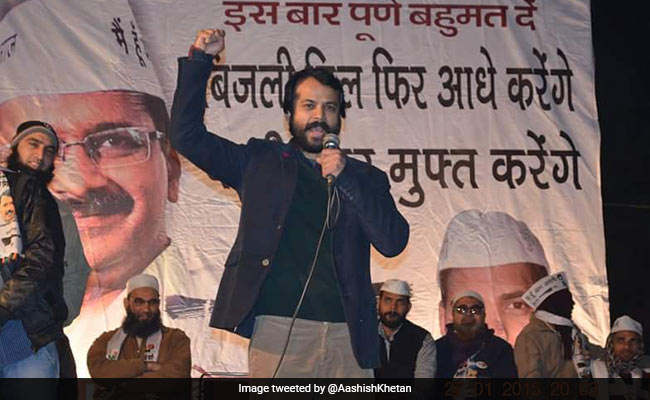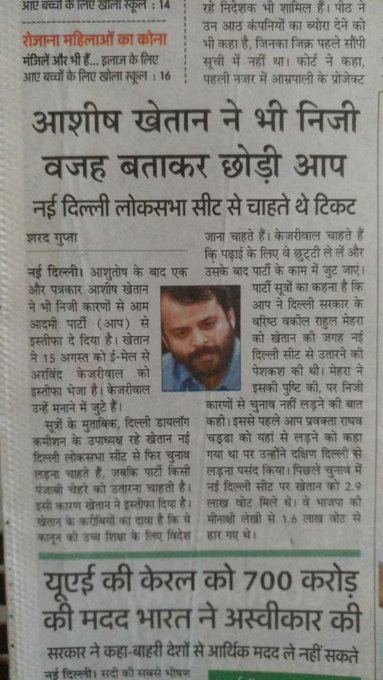
Like Ashutosh, Ashish Khetan was also counted among the closest aides of Chief Minister Arvind Kejriwal and a member of AAP’s top leadership.
Ashish Khetan, who did not deny the resignation, said he was not involved in “active politics at the moment” and was not interested in rumours.
Aam Aadmi Party (AAP) leader Ashish Khetan’s posts on social media today uncorked another crisis for Arvind Kejriwal’s party within a week of Ashutosh’s exit. In the posts, Ashish Khetan said he is “not involved in active politics” and had taken the decision after questioning himself for two years.
Ashish Khetan sent his resignation to Mr Kejriwal on August 15 Independence Day, the Press Trust of India quoted sources as saying. Ashutosh resigned the same day citing a “very, very personal reason”.
On Twitter, the 46-year-old left room for speculation by suggesting “extrapolation” and “rumours”.
A Facebook post had a detailed explanation. “For the past two years, I have been plagued with self-doubt and the question of whether I wanted to continue in electoral politics. Early this year I made my decision to quit active politics after much deliberation and in consultation with family and close friends,” said he said, adding that he waited for an “opportune time” to formalize his decision.
He added that his “personal decision” to move away from the party and electoral politics should not be viewed as a reflection on AAP.
Ashish Khetan, an investigative journalist, joined AAP in 2014 and contested the national election from the New Delhi constituency in the capital but lost to the BJP’s Meenakshi Lekhi.
He was appointed vice chairman of the Delhi Dialogue and Development Commission, an advisory body attached to the Delhi Government.
In April, he quit the post, saying he was joining the legal profession. He had also referred to “frustration” because of the tussle between the AAP government and the centre.
PTI quotes sources as saying Ashish Khetan wanted to contest the same seat that he had lost, in the 2019 national election, but the party was reluctant. In his Facebook post, he denied the claims. “The party had graciously asked me to contest the upcoming Lok Sabha elections but I had politely turned it down. Contesting one more election would have further entrenched me in the world of politics, something I don’t want at this point in time.”
Like Ashutosh, Ashish Khetan was also counted among the closest aides of Chief Minister Arvind Kejriwal and a member of AAP’s top leadership.
Last week, Mr Kejriwal said he would not accept Ashutosh’s resignation and tweeted: “How can we ever accept your resignation? Not in this lifetime.”
But Ashutosh remained firm on his exit. He had announced his resignation in a tweet that took AAP by surprise.
Ashutosh, too, contested the 2014 Lok Sabha elections and lost. In January, after seven eminent professionals turned down AAP’s offer of Rajya Sabha seats, there was a buzz that the senior journalist was being considered for a slot.
But the party’s final choice – senior leader Sanjay Singh, Delhi-based businessman Sushil Gupta and chartered accountant ND Gupta – reportedly upset several leaders.
Kumar Vishwas, a founder member of the party, had quit the party days later, protesting that he was being “punished for speaking the truth.”
The AAP leadership has changed drastically in the six years since it debuted in Indian politics with the promise of ending corruption. Two other founder members, Prashant Bhushan and Yogendra Yadav, were expelled in 2015 on charges of indiscipline and anti-party activities.
Congress leader Sharmishtha Mukherjee, in a tweet, suggested that there was something “terribly wrong” within the party. “Within 6 years of forming the party, most of the old guards, founding members of AAP have left. Obviously something is terribly wrong within the party,” she posted.




